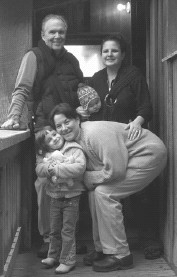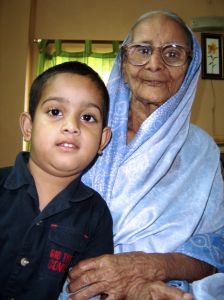By Nancy Da Silva
 Years ago, a new father had little to do with parenting. The traditional view has him in the waiting room, passing out cigars, and then going off to work to earn money to keep a roof over his new baby’s head and provide the infant with food and diapers. That was the extent of his parenting contribution.
Years ago, a new father had little to do with parenting. The traditional view has him in the waiting room, passing out cigars, and then going off to work to earn money to keep a roof over his new baby’s head and provide the infant with food and diapers. That was the extent of his parenting contribution.
Infant care was left to the mother, the primary caregiver. She was the one who took charge of the feedings, changing the diapers, and suffering through the sleepless nights. As the result, the mother had an advantage in the baby-bonding process.
Times have changed. For the most part, society has evolved its picture of the father’s role. New research comes out regularly explaining the importance of fathers taking an active role in raising and nurturing the new baby, right alongside the mother.
Baby Knows Dad’s Voice, Too
The British documentary series “The Human Mind” suggests that a newborn’s brainwaves respond differently to his mother’s voices versus his father’s voice. This, in turn, leads to different responses by the infant to each caregiver. For example, a crying infant will often be comforted more easily in his mother’s arms than in his father’s, leading some experts to believe that, for the most part, the maternal bond is instinctual.
But others, who challenge those findings, assure new dads that bonding is actually a process that can be developed over time.
The Father-Infant Bond can be Just as Strong as the Mother-Infant Bond
Sonia, a 26-year-old mother of one from Toronto, Canada, explained: “I think the first moment that it actually hit [the father] that this was his little baby was when the nurse pulled her from me, wiped her off, and plopped her into his arms. The expression on his face just changed completely, and I could just see that adoration as he watched her. It’s so hard to describe, but in that instant, something happened. She grew in my body and came out of my body, so I always knew she was a part of me, but I think that when he was able to feel her in his arms for the first time, he knew she was a part of him, too.”
If we were to switch the primary care roles where the father is the one who feeds the baby, plays with him, and shows him affection, the bond between them would strengthen to the point where the mother would have the less intense parent-child bond.
The Long-Term Benefits of a Strong Father-Infant Bond
Babies, whose fathers take an active interest in their development, score higher on mental development tests and are shown to handle stressful situations later in life much better than if the father leaves the bonding and care to the mother. Researchers even suggest that a strong fatherly bond leads to higher academic excellence and improved social skills and self esteem.
“In terms of soothing [the baby] when she’s in pain, [the father] would get so frustrated when she preferred me over him that he began to feel inadequate and just stopped trying, because he didn’t see a point,” Sonia said. “Now, if I’m there, she won’t want him to soothe her. If he had stuck with it, it would be a totally different story.”
Society’s Response to the Changing Father’s Role
How is this father-baby bonding supposed to happen when, in most cases, mothers have the advantage of not only the biological bond but the time afforded new mothers by maternity leave? Some companies now offer paternity leave of up to six weeks for new fathers. While California became the first U.S. state to offer paid leave for fathers in 2004, most of North America is slowly following suit with varying degrees of time and levels of pay offered.
Now what are fathers to do with this extra time they’ve been given?
The Father-Infant Bond Can Begin In Utero
They could take advantage of the prenatal months to start bonding with their child. Mothers have that extra nine months before the baby is born to begin bonding with the child, but expecting fathers can also begin their bonding with the baby at this point, too. Helping the mother-to-be with doctor visits, sharing in her experiences, preparing the baby’s room together, and talking to the baby in the womb are all options that can help the baby become familiar with the father’s voice.
In addition, his willingness to be involved in the pregnancy will make the mother more likely to trust him to take over certain baby care tasks once the infant arrives.
The baby will benefit from getting to know each parent separately, and while it is important that the father take the time to build his own unique relationship with his child, it’s only when parents work together, respectful of those separate necessary bonds, that the child can truly grow into a strong, loving, and well-adjusted human being.
“She grew in my body and came out of my body, so I always knew she was a part of me, but I think that when he was able to feel her in his arms for the first time, he knew she was a part of him, too.” ~ Sonia
 The Sturgis (Mich.) Journal has published an article, “Ideology Gives Way to Nurturing for Adoptive Parents,” on November 26, 2008, that features a couple who have fully embraced Attachment Parenting during their last 36 years of foster parenting.
The Sturgis (Mich.) Journal has published an article, “Ideology Gives Way to Nurturing for Adoptive Parents,” on November 26, 2008, that features a couple who have fully embraced Attachment Parenting during their last 36 years of foster parenting.





